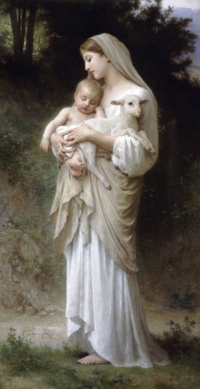Childhood
From The Art and Popular Culture Encyclopedia
|
"It has been argued that childhood is not a natural phenomenon but a social construction. Philippe Ariès, an important French medievalist and historian, pointed this out in his book Centuries of Childhood. This theme was then taken up by Hugh Cunningham in his book the Invention of Childhood (2006) which looks at the historical aspects of childhood from the Middle Ages to the 1970s."--Sholem Stein |
|
Related e |
|
Featured: |
Childhood is the age span ranging from birth to adolescence. In developmental psychology, childhood is divided up into the developmental stages of toddlerhood (learning to walk), early childhood (play age), middle childhood (school age), and adolescence (post-puberty).
As a construct
It has been argued that childhood is not a natural phenomenon but a social construction. Philippe Ariès, an important French medievalist and historian, pointed this out in his book Centuries of Childhood. This theme was then taken up by Cunningham in his book the Invention of Childhood (2006) which looks at the historical aspects of childhood from the Middle Ages to what he refers to as the Post War Period of the 1950s, 1960s and 1970s.
Ariès published a study in 1961 of paintings, gravestones, furniture, and school records. He found that before the 17th-century, children were represented as mini-adults. Since then historians have increasingly researched childhood in past times. Before Ariès, George Boas had published The Cult of Childhood.
During the Renaissance, artistic depictions of children increased dramatically in Europe. This did not impact the social attitude to children much, however—see the article on child labour.
The man usually credited with - or accused of - creating the modern notion of childhood is Jean Jacques Rousseau. Building on the ideas of John Locke and other 17th-century liberal thinkers, Rousseau formulated childhood as a brief period of sanctuary before people encounter the perils and hardships of adulthood. "Why rob these innocents of the joys which pass so quickly," Rousseau pleaded. "Why fill with bitterness the fleeting early days of childhood, days which will no more return for them than for you?"
The Victorian Era has been described as a source of the modern institution of childhood. Ironically, the Industrial Revolution during this era led to an increase in child labour, but due to the campaigning of the Evangelicals, and efforts of author Charles Dickens and others, child labour was gradually reduced and halted in England via the Factory Acts of 1802-1878. The Victorians concomitantly emphasized the role of the family and the sanctity of the child, and broadly speaking, this attitude has remained dominant in Western societies since then.
See also
- Child
- The Age of Innocence (painting)
- Birthday party
- Childhood and migration
- Child
- Children's party games
- Coming of age
- List of child related articles
- List of traditional children's games
- Rite of passage
- Sociology of childhood
- Street children


